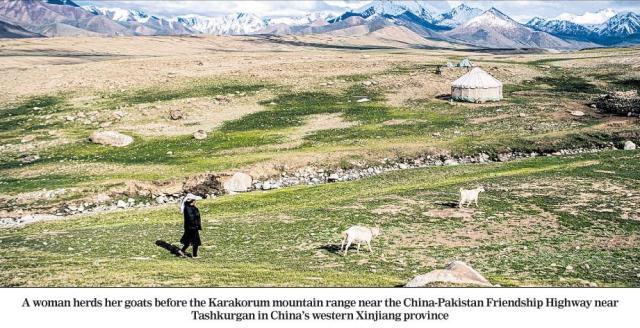FRIENDSHIP HIGHWAY ‘RUNS ONE WAY’ – ONLY ABOUT CHINA’S GROWTH, NO BENEFITS TO PAK: TRADERS

(Note: The China-Pakistan Economic Corridor (CPEC)  — connecting Kashgar to the Arabian Sea port of Gwadar. CPEC is a 3,000-km network of roads, railways and pipelines to transport oil and gas from southern Pakistan's Gwadar Port to Kashgar city, northwestern China's Xinjiang Uygur autonomous region. The CPEC will reduce China's routes of oil and gas imports from Africa and the Middle East by thousands of kilometers, making Gwadar Port a potentially vital link in China's supply chain. Originally valued at $46 billion, the value of CPEC projects is now worth $ 62 billion. A Reality Check on the ambitious project. Isaac Gomes, Associate Editor, Church Citizens' Voice).
— connecting Kashgar to the Arabian Sea port of Gwadar. CPEC is a 3,000-km network of roads, railways and pipelines to transport oil and gas from southern Pakistan's Gwadar Port to Kashgar city, northwestern China's Xinjiang Uygur autonomous region. The CPEC will reduce China's routes of oil and gas imports from Africa and the Middle East by thousands of kilometers, making Gwadar Port a potentially vital link in China's supply chain. Originally valued at $46 billion, the value of CPEC projects is now worth $ 62 billion. A Reality Check on the ambitious project. Isaac Gomes, Associate Editor, Church Citizens' Voice).
The Telegraph, Kolkata
3 August 2017
Tashkurgan ( China), Aug. 2 ( AFP): The China- Pakistan Friendship Highway runs over 1,300km from the far western Chinese city of Kashgar through the world's highest mountain pass and across the border.
For China, the two- lane thoroughfare symbolises a blossoming partnership, nourished with tens of billions of dollars of infrastructure investment.
But for many Pakistani businessmen living and working on the Chinese side of the border, the road is a oneway street.
" China says our friendship is as high as the Himalayas and as deep as the sea, but it has no heart," said Pakistani businessman Murad Shah, as he tended his shop in Tashkurgan, 120km from the mountain pass where trucks line up to cross between China's vast Xinjiang region and Pakistan.
" There is no benefit for Pakistan.
It's all about expanding China's growth," Shah said, as he straightened a display of precious stones.
The remote town of around 9,000 is at the geographic heart of Beijing's plans to build a major trade artery — the China- Pakistan Economic Corridor ( CPEC) — connecting Kashgar to the Arabian Sea port of Gwadar.
The project is a crown jewel of China's One Belt, One Road ( OBOR) initiative, a massive global infrastructure programme to revive the ancient Silk Road and connect Chinese companies to new markets around the world. In 2013, Beijing and Islamabad signed agreements worth $ 46 billion to build transport and energy infrastructure along the corridor, and China has upgraded the treacherous mountain road better known as the Karakoram Highway.

While both countries say the project is mutually beneficial, data shows a different story. Pakistan's exports to China fell by almost 8 per cent in the second half of 2016, while imports jumped by almost 29 per cent.
In May, Pakistan accused China of flooding its market with cut- rate steel and threatened to respond with high tariffs.
" There are all of these hopes and dreams about Pakistan exports," said Jonathan Hillman, a fellow at the Centre for Strategic and International Studies in Washington.
" But if you're connecting with China, what are you going to be exporting?" One answer is Nigerian " male enhancement" supplements: expired medications which Pakistani merchants in the oasis city of Hotan recently peddled to bearded Muslims walking home from Friday prayers.
The products were typical of the kinds of small consumer goods brought by Pakistani traders into Xinjiang: medicine, toiletries, semi- precious stones, rugs and handicrafts. Pakistani businessmen in Xinjiang see few benefits from CPEC, complaining of intrusive security and capricious customs arrangements.
" If you bring anything from China, no problem," said Muhammad, a trader in the ancient Silk Road city of Kashgar, who declined to give his full name. But he said tariffs on imported Pakistani goods are " not declared. Today it's 5 per cent, tomorrow maybe 20.
Sometimes, they just say this is not allowed". Three years ago, Shah was charged between eight and 15 yuan per kilo to bring lapis lazuli, a blue stone.
The duty has since soared to 50 yuan per kilo, he said.
Customs officials told AFP the " elements influencing prices were too many" for them to offer a " definite and detailed list" of costs.
While large- scale importers can absorb the tariffs, independent Pakistani traders have benefited little from CPEC, said Hasan Karrar, political economy professor at the Lahore University of Management Sciences. Alessandro Ripa, an expert on Chinese infrastructure projects at Ludwig Maximilian University Munich, said the highway " is not very relevant to overall trade" because " the sea route is just cheaper and faster". A woman herds her goats before the Karakorum mountain range near the China- Pakistan Friendship Highway near Tashkurgan in China's western Xinjiang province
















